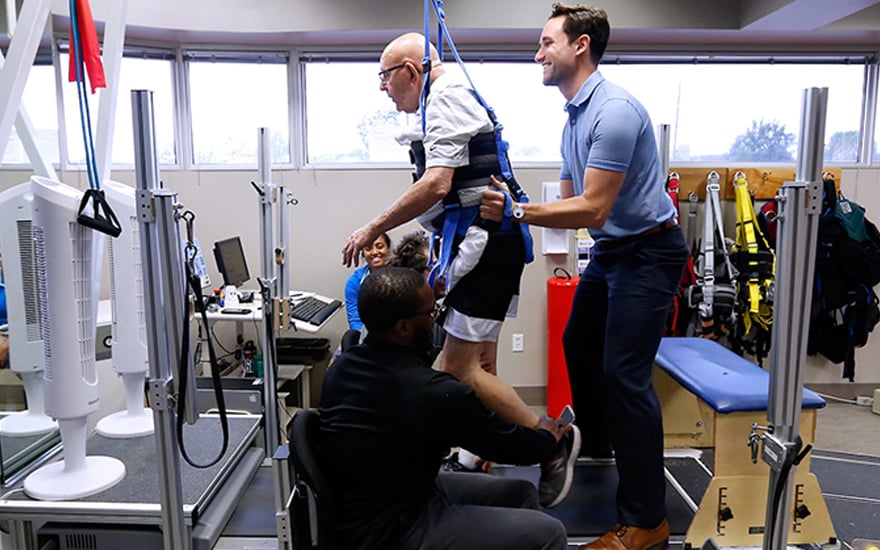
A specialty in health care is an area of practice focused on a specific patient group or types of symptoms and conditions. Physical therapists who choose to focus their practice in a specialty area may attend residency programs and achieve board certification in a specialty, or complete fellowship programs in a subspecialty.
What are Residencies in Physical Therapy?
The American Board of Physical Therapy Residency and Fellowship Education accredits physical therapy residency programs. Residencies are post-professional planned learning experiences (meaning after graduating from a doctor of physical therapy program) that provide the essential knowledge, skills, and responsibilities of an advanced physical therapist within a defined area of practice. Residencies take a minimum of 10 months to complete, but most are 12-month programs; some are 15 to 18 months in duration. Physical therapists may choose to complete a residency program in one or more of these physical therapy specialty areas:
- Acute Care.
- Cardiovascular & Pulmonary.
- Clinical Electrophysiology.
- Geriatrics.
- Neurology.
- Oncology.
- Orthopaedics.
- Pediatrics.
- Sports.
- Women’s Health.
- Wound Management.
What Are Physical Therapy Fellowships?
ABPTRFE also accredits post-professional fellowship programs offered by universities and other teaching institutions, such as hospitals and large physical therapy practices. Fellowships can take as few as 10 months to complete, but most are 12-month programs; some are 15 to 18 months in duration. These intensive training programs are available to physical therapists who have achieved board certification with advanced clinical training and experience in the following subspecialty areas:
- Critical care: Rehabilitation of patients with complex medical problems in the acute care (hospital) setting.
- Hand therapy: Rehabilitation of patients with hand and upper limb injuries and conditions.
- Neonatology: Evaluation and treatment of newborns and infants who require intensive medical care in a hospital setting.
- Neurologic movement disorders: Evaluation and treatment of movement disorders, such as Parkinson disease, dystonia, chorea and Huntington's disease, ataxic syndromes, tremor and essential tremor, tics and Tourette syndrome, restless leg syndrome, stiff person syndrome, and related gait disorders.
- Orthopaedic manual physical therapy: Highly specialized skills in advanced hands-on (manual) techniques.
- Performing arts: Evaluation and treatment of those in the performing arts.
- Spine: Advancing spine care.
- Sports Division 1: Evaluation and treatment of athletes engaged in high-level sports competition.
- Upper extremity athlete: Developing explicit knowledge of complex shoulder and elbow conditions.
What Kind of Physical Therapist Do I Need?
When choosing your physical therapist, remember that all physical therapists who graduate and pass their licensure exam are qualified physical therapists who can help you or refer you to someone if you need specialized treatment. Some physical therapists focus on certain areas and can have advanced experience and/or additional training in evaluating and treating patients with complex medical conditions or advanced rehabilitation needs? You may want to consider seeing a physical therapist who has:
- A practice focusing on treating people like you (such as athletes, older adults, or children) or those with certain types of conditions (such as musculoskeletal, pelvic health, cancer, neurological).
- Completed residency training in one of the physical therapy specialty areas.
- Earned board certification in one of the physical therapy specialty areas.
- A board-certified clinical specialist who also has also completed a fellowship program in a subspecialty area.
The American Physical Therapy Association offers Find a PT to help you search for a physical therapist with these and other credentials near you.
Physical therapists are movement experts. They improve quality of life through hands-on care, patient education, and prescribed movement. You can see a physical therapist without a physician's referral for evaluation and treatment.*
For more details, view a list of the physical therapy residency programs (by specialty) or fellowship programs (by subspecialty).
*Insurance and corporate policies or state laws may still require a physician's referral or limit treatment scope and duration without a referral. Insurance policies also may limit you to in-network providers.


